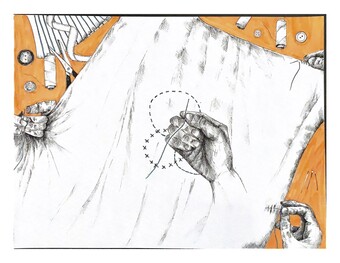Ask if it’s Equity—Maybe
This September, Actors’ Equity Association unveiled a new social media campaign that puts non-union touring productions squarely in the crosshairs (read about it here). “Ask if it’s Equity” is a message aimed directly at audiences, asking them to ensure that when they see a touring play that it is an Equity production rather than a non-union tour. The website for this campaign says this: “Performers and stage managers on Broadway work under Actors’ Equity contracts; which means they receive fair pay with benefits and enjoy quality working conditions. Unless you are seeing an Equity production, you’re not seeing Broadway.”
The problem is, with the advent of the tiered contract touring system (a system under which certain tours can lower minimum wages for actors based on projected producer’s revenue, among other factors; there are B, C, and D tiers), these days Equity contracts do not guarantee fair pay or benefits. There’s been a longstanding battle between Equity and tour producers who take their shows non-union. It’s a battle that Equity has not consistently been winning. To compete and keep producers on board, Equity has been slicing touring wages in an attempt to cut overall costs.
And so I take issue with the sentence “Unless you are seeing an Equity production, you’re not seeing Broadway.” Was there a time that this was true? Probably. There was a time that touring contracts matched Broadway production contracts from a financial standpoint (before per-diem). Today very few of them do. You’d be hard-pressed to find another sector that’s had wages drop so dramatically over the past decade. Specifically, many Equity tours have become what are known as “Short Engagement Touring Agreements” with salaries that can be as low as $550 a week (read more here). Broadway’s minimum wage is $1,861 per week, more than triple the minimum on some of today’s currently running Equity tours. These tours aren’t Broadway and marketing them as such is frankly disingenuous, especially as the campaign attempts to draw distinctions between Equity and non-union productions when it comes to actor treatment and fair pay. There are actors on the non-union tour of Camelot making $1,050 a week. Are Equity tours of a higher quality than non-union productions? Very possibly. There’s a larger talent pool to work with and performers tend to be more experienced. That said, whether or not a tour is a union production has never been shown to have a demonstrable effect on ticket sales that I’ve been able to uncover.
Of course, one could argue that all of these facts are why a campaign like this is so necessary. The more the union can bolster its image and drive audiences to Equity productions, the stronger the union will be when it comes to salary negotiations. And this is important. Equity does need to be a strong union, and it’s a difficult proposition when there’s such a vast supply of talent—which is constantly swelling as more and more young artists graduate from their university theater programs and move to the cities. Regardless, I can’t help but wonder if this is really the best way to go about it. Trying to appeal to audiences as a method by which to influence presenters certainly does make sense on the face of things. Mary McCall, the Executive Director of Actors’ Equity, has been quoted as saying that this campaign is "intended to thank local presenters for booking union shows," but I’m not so sure that’s how it comes off.
All of the Equity touring productions playing in Chicago are listed on the website for this campaign. This is reasonable, sensible—aimed at informing audiences of their Equity options. All well and good. Then, below a stark, heavy, white line there’s a list of all the non-union touring productions playing in Chicago. Not even just tours of a comparable nature to the Equity productions playing (think along the lines of Rodgers and Hammerstein’s Cinderella), but those such as Evil Dead The Musical, which never appeared on Broadway and seems hardly comparable in terms of demographic draw. This all may seem at first glance to be just an incidental detail, but it strikes me as a pretty direct attack. Rather than simply touting the merits of Equity tours (which, as I’ve noted, can’t be taken entirely for granted), the fact that the site goes on to list and point a finger at the non-union productions seems to be a way of criticizing not only the presenters and producers of these tours, but also the performers themselves.
It seems necessary to clarify here that non-union actors aren’t scabs. They aren’t trying to bust the union. This isn’t a scene out of history textbooks or Newsies (union disputes, scabs, musical theater—it seems relevant). Most of them want to eventually join the union. Also, young artists who have gone Equity early on as a result of booking a tour often return home only to find that the majority of opportunities for young actors are in the non-union world. Non-union tours have their issues, undoubtedly, but they provide employment and opportunities for young actors not yet ready to go Equity—they allow for necessary flexibility. It seems strange for a union that represents actors to lash out at those who may well end up joining their ranks.
In a perfect world, Equity would be strong, every tour would be union, and more actors would be able to make a living doing what they love. I do think it’s possible for this to happen. But that simply isn’t the world we live in yet. It’s difficult for many actors to go union in the first place, and as a non-union performer, auditioning can often become just sitting around for twelve hours at an Equity Principal Audition before being told to go home. Non-union tours provide an avenue for younger, newer actors to make a living working and gaining experience that will help them on in the future. I’m certainly not advocating that Equity simply give up on tours, nor am I suggesting the union not advocate on behalf of its constituency. Should Equity be trying to protect itself and bolster the image of Equity productions? Of course—just not at the expense of actors who simply want to make a living doing what they love.
















Comments
The article is just the start of the conversation—we want to know what you think about this subject, too! HowlRound is a space for knowledge-sharing, and we welcome spirited, thoughtful, and on-topic dialogue. Find our full comments policy here
A very interesting, informative, relevant, and well-written article.
Thank you!
I've been thinking a great deal about this campaign and the response it has elicited from the theatre community. Thank you for this articulate and multifaceted take on the issue. Your third paragraph is, for me, the newest piece in the puzzle and contains an excellent point: now that touring contracts are no longer in the same financial ballpark as Broadway contracts, can we really even claim an equivalency? Great point.
You follow that by allowing that only a stronger position for the union at the bargaining table can lead to better contracts, and that that's exactly the purpose of the campaign. You're clearly looking at this from several sides and I appreciate that. The majority of on-line responses since the rollout in the fall, both pro and con, have been too knee-jerk and too blunt to truly forward the conversation. (A 140 character limit can exacerbate that but I've talked to people in person and read posts on Facebook without that limit and, still, tirades and temper tantrums on both sides outweigh consideration and conversation.)
It pains me that many see the target of the campaign as the non-union actors and stage managers. But I understand the confusion. If not them, who is the target? Let's look at that word: target. Just to tighten the linguistic reigns on this a bit, can we agree the intended *recipient* of the message of the campaign is the ticket buyer? I think the union is framing this as a consumer education campaign and I agree with that goal and support it. But, there is a target and that fact indicates that there is an attack or at least shots being fired. It's the reluctance of Equity to blatantly call out that target that, I believe, is the main contributor to the confusion about who's blood we are trying to draw. (I use the word "we" because the union is the members of which I am one, not because I claim to speak for Equity.)
The actual target is the presenter, the party we feel has done us damage by offering lower and lower guarantees to the producers which drives out contracts downward. In this case it is Broadway In Chicago. You wonder what Evil Dead The Musical (and Men Are From Mars…. and Annie, which are all listed below that stark, heavy, white line) did to deserve censure? The actors and stage managers did nothing but accept hard-to-come-by employment in their fields. The presenter, though, sold them under the brand, *Broadway* In Chicago. And, the union (we) say that that is wrong. But, because we're fearful (for good reason) to blatantly put the red dot of our laser scope on the presenter's forehead before we pull the trigger, when the bullets start whizzing past our fellow actors and stage mangers (the most public faces of these productions), of course they think we're shooting at them. Who wouldn't? And it’s fire that does not, cannot, feel friendly.
Thank you for helping me get a little clearer in my thinking on this and for contributing to the conversation, not the conflagration.
As you alluded to, if AEA wants to get right to the technical heart of it, they should advertise, "Ask if it's a Production Contract?" Then then could use the Broadway argument. But, otherwise, they need to quit trying to manipulate and degrade the theater going experience. I was in Indianapolis and Cincinnati last week surveying what BAA is bringing to town, and The Lion King is the only one out of 10 shows using it. Plus, except for Elf, most of the titles were at least 20 years old! It is almost as if The Road has turned into the regional theater's cash cow of a series of A Christmas Carols. Or at least presenters and producers hope! Regardless, if its equivalency that AEA is marketing and prodding people to ask about, then this education is apart of that.
The question of the quality of the content offered is an entirely another article, but is truly at the heart of the argument. If audiences go and it's good, what does the audience care? They might be even more impressed knowing that they just saw a bunch of kids fresh out of college pull off Beauty and the Beast. Conversely, what happens if audiences ask the question, expect a great AEA production, and walk out at intermission appalled?
It's entirely irrelevant. It's like needing to know before the show if the actors are Stanislavsky based, or if they rely on spirit animals to find their characters in order to truly appreciate their performance. Does it matter that SM went to Columbia? Is the CM ATPAM? No.One.Cares. They care about the play. After all, it is the thing.
As a proud AEA member, I take objection to the vilification of non-union performers. I understand the need to protect the road to give employment to an over saturated pool of AEA performers based out of the main hubs, as that's where most point of origination's are. But, as we learned from the events that brought about the SET tiers, presenters are offering guarantees that simply can't support the costs from a shrinking subscriber base. If all shows were Equity, how does the next generation of performers expect to receive their chops and get paid doing so? Other than summer stock and children's theater, (generally speaking) there is barely a theater company in each major city in the US that pays non-equity actors above minimum wage for more than 4-6 weeks at a time! And don't look to grad programs, despite the training, receiving your card from a grad program is not even close to earning a diploma in craft which graduates young actors to the level of being a professional in the theater. They need a proving ground. They need confidence in being able to give life as an artist a serious go. They need to work. AEA members do too. But not at the expense of anyone else.
Does anybody really need to be required to "Ask if it's Equity?" I feel this is a slippery slope for the union to start treading. AEA should be mindful of what questions could follow. Theater is about inclusion and bringing community together. Ok, BAA is about making a buck, and so are the presenters and producers. Regardless, what we need is to work together to keep creating great content that people want to see. They more we do that, the more jobs (AEA and non-equity) will be created. Then the only question we should want to hear people ask is, "Can I get a ticket to the show?"
Thanks for this incredibly insightful and well thought out response. You've pretty much gotten to the heart of it. People want to see good theater. There needs to also be a realm for young actors to make a living, to develop, and to take that next step forward.The more we can make theater good, popular, and affordable, the better off all parties involved will be.